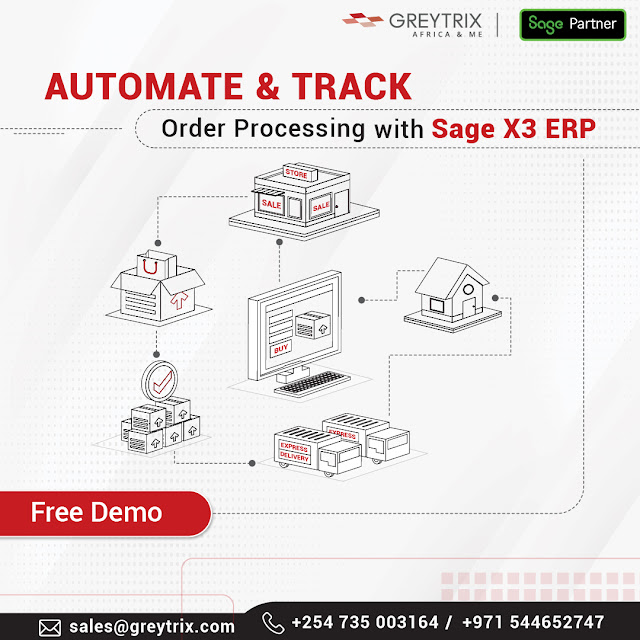Top ERP Features Revolutionizing the Logistics and Transportation Industry
The logistics and transportation industry operates in a
complex environment, balancing fluctuating demand, stringent regulations,
global supply chains, and customer expectations. To meet these demands,
companies are increasingly turning to Enterprise Resource Planning (ERP)
systems to streamline their operations and optimize efficiency. Modern ERP
solutions offer a wide range of features that revolutionize how logistics and
transportation businesses operate. In this blog, we will explore the top ERP
features that are transforming the industry.
1. Real-Time Inventory Management
Effective inventory management is crucial for logistics and
transportation companies. The ability to track and manage inventory in
real-time helps companies avoid overstocking or understocking, which can lead
to increased costs or missed opportunities. ERP systems provide an integrated
view of inventory levels, orders, and shipments across multiple locations. This
visibility enables companies to make informed decisions about stock replenishment,
distribution, and demand forecasting.
With real-time updates on inventory levels, transportation
companies can ensure that the right products are available at the right time,
reducing delays and enhancing customer satisfaction. This feature is especially
important for businesses that manage global supply chains and need to
coordinate inventory across multiple warehouses and distribution centers.
2. Advanced Fleet Management
Fleet management is a critical component of logistics and
transportation operations. ERP systems equipped with fleet management modules
allow companies to monitor their fleet’s performance, optimize routes, schedule
maintenance, and manage driver assignments. These features help businesses
reduce operational costs and increase efficiency by ensuring that vehicles are
utilized effectively and that drivers follow optimized routes.
Fleet management features in ERP systems also provide
insights into vehicle health and fuel consumption, helping companies lower
their carbon footprint and meet sustainability goals. By minimizing downtime
and reducing fuel costs, logistics companies can improve their overall
profitability.
3. Transportation Planning and Scheduling
Efficient transportation planning and scheduling are key to
ensuring timely deliveries and reducing operational costs. ERP solutions
provide transportation management modules that allow companies to plan and
optimize their transportation routes, considering factors like delivery times,
traffic conditions, and fuel costs. This feature helps logistics companies
ensure that they meet customer delivery expectations while minimizing
transportation expenses.
Additionally, ERP systems offer features such as load
optimization, which ensures that vehicles are loaded to their maximum capacity
while adhering to weight limits. This not only reduces the number of trips
required but also lowers transportation costs and carbon emissions.
4. Integrated Warehouse Management
Warehouse management is a critical area where ERP systems
can make a significant impact. Integrated warehouse management features within
ERP systems allow companies to streamline their storage, picking, packing, and
shipping processes. By automating these processes, businesses can reduce
errors, improve order accuracy, and speed up fulfillment times.
With ERP-powered warehouse management, companies can also
track inventory movement within the warehouse, monitor stock levels, and ensure
that products are stored in the most efficient manner. This integration
improves overall warehouse efficiency, reduces operational costs, and enhances
customer satisfaction by ensuring on-time delivery.
5. Data Analytics and Reporting
In the logistics and transportation industry, data is key to
making informed decisions. ERP systems provide advanced analytics and reporting
capabilities that help companies analyze key performance indicators (KPIs) such
as delivery times, transportation costs, and fleet performance. With real-time
data insights, logistics companies can identify areas for improvement, reduce
operational inefficiencies, and make data-driven decisions.
Data analytics in ERP systems also help logistics companies
forecast demand, optimize resource allocation, and predict potential
disruptions in the supply chain. These insights enable businesses to remain
agile and responsive in a rapidly changing market.
6. Order and Shipment Tracking
Modern ERP systems offer real-time order and shipment
tracking features that provide visibility into the status of shipments at every
stage of the delivery process. This feature allows logistics companies to keep
customers informed about their shipment status, improving customer satisfaction
and trust.
With automated notifications and updates, customers can
receive accurate delivery time estimates, which reduces the need for customer
service inquiries. Furthermore, order and shipment tracking helps logistics
companies identify potential delays and take proactive measures to resolve
issues, ensuring timely deliveries.
7. Compliance Management
The logistics and transportation industry is subject to a
wide range of regulations, including those related to safety, emissions, and
labor. ERP systems help businesses ensure compliance by automating the tracking
and reporting of regulatory requirements. With features that monitor vehicle
safety, driver hours, and emissions, ERP solutions help companies stay
compliant with industry regulations and avoid costly fines.
Compliance management features also streamline the process
of preparing and submitting necessary documentation, such as customs
declarations and safety reports. By automating compliance processes, logistics
companies can focus on their core operations while ensuring that they remain
within regulatory guidelines.
8. Customer Relationship Management (CRM) Integration
Maintaining strong relationships with customers is essential
for success in the logistics and transportation industry. ERP systems with
integrated CRM modules help businesses manage customer interactions, track
sales, and monitor customer satisfaction. By having a centralized system that
manages both operations and customer relationships, companies can deliver
better customer service and improve client retention.
CRM integration allows logistics companies to provide
personalized service, respond to customer inquiries quickly, and manage
contracts and pricing agreements effectively. This helps build long-term
relationships and fosters customer loyalty.
Conclusion
The logistics and transportation industry is facing
increasing pressure to improve efficiency, reduce costs, and meet rising
customer expectations. ERP systems offer a comprehensive solution to these
challenges by providing real-time insights, automating key processes, and
enhancing visibility across the supply chain. By leveraging the advanced features
of ERP systems—such as real-time inventory management, fleet management,
transportation planning, and data analytics—logistics companies can
revolutionize their operations, stay competitive, and meet the demands of the
modern market.
As the industry continues to evolve, adopting the right ERP
solution will be critical to staying ahead of the competition and achieving
sustainable growth.
For more information on ERP Transportation And Logistics, contact us at sales@greytrix.com or visit Greytrix Africa Ltd.




Comments
Post a Comment